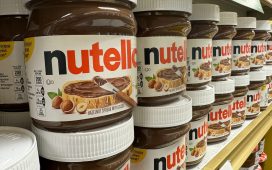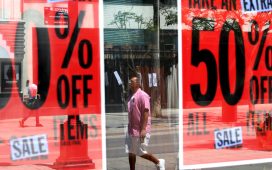Introduction: UK retail sales fall sharply
Good morning, and welcome to our rolling coverage of business, the financial markets and the economy.
Economic news takes on extra significance in an election campaign. Every survey and data release becomes a healthcheck on the economy, scrutinised for signs that the economy is improving, or ailing.
And this morning, we’ve just learned that retail spending weakened last month, with sales volumes and values both falling sharply in April.
Retail sales across Great Britain tumbled by 2.3% in April, the Office for National Statistics reports, following a fall of 0.2% in March (which has been revised down from 0.0%).
On an annual basis, retail sales volumes were 2.7% lower than in April 2023 – and 3.8% below their levels before the Covid-19 pandemic. Not an encouraging economic signal.
Sales volumes fell across most sectors, with clothing retailers, sports equipment, games and toys stores, and furniture stores doing badly.
Retail sales fell across most sectors, with clothing retailers, sports equipment games and toys stores, and furniture stores doing badly, as poor weather reduced footfall.
Read the release ➡️ https://t.co/g1IVisBgMQ pic.twitter.com/ECOQOyIJqt
— Office for National Statistics (ONS) (@ONS) May 24, 2024
The ONS blames the rain and storms which hit Britain in April, saying that “poor weather reduced footfall.” April was the UK’s sixth wettest April since 1836.
Sales volumes at department, clothing, household and other non-food stores fell by 4.1% in April, which is the joint largest fall since January 2021.
Phil Monkhouse, UK Country Manager at global financial services firm Ebury, says:
“Retailers were caught in the rain in April as retail sales volumes unexpectedly dropped by 2.3%, marking the first significant month-on-month downturn since December’s 3.3% cliff face drop.
“Cooling inflation and a marked dip in energy prices in April didn’t translate to heightened footfall as sticky interest rates and the wetter weather held back consumers from splashing out.
“With the snap general election announcement injecting fresh uncertainty into the minds of consumers, retailers should not bet on the summer weather significantly lifting spending any time soon.”
The slump in retail spending comes despite a rise in UK consumer confidence, which has risen this month to its highest in nearly two-and-a-half years.
GfK’s Consumer Confidence Index rose by two points in May to minus 17, the highest level since December 2021, lifted by improved optimism about personal finances.
The agenda
-
7am BST: UK retail sales for April
-
7am BST: Ofgem sets UK energy price cap
-
1.30pm BST: US durable goods orders for April
-
3pm BST: University of Michigan’s index of US consumer confidence
Key events
Energy prices are an early general election football, with all sides trying to please the crowd.
Claire Coutinho MP, energy secretary, has announced that the energy price cap would be retained in every year of the next parliament, if the Conservatives win July’s election.
The Conservatives are also pledging to make it easier for households to compare energy prices, and switch at the right time to benefit from lower tariffs.
Coutinho also claims the government’s “bold action” has brought energy bills down – though the 7% drop coming in July was actually due to falling wholesale prices in the energy markets.
Coutinho says:
“Labour does not have a serious approach to Britain’s energy security and they aren’t honest about the costs that their reckless net zero targets would place on households.
“Thanks to our bold action, energy bills are at their lowest in two years, now we’re telling suppliers to put consumers first and bring real competition back to the market – cutting bills further and improving customer service.
“Only the Conservatives have a clear plan for a secure future where we reach net zero without punishing families with extra costs.”
Labour’s plan is based around creating a publicly-owned green electricity generator, called Great British Energy, which Sir Kier Starmer says will cut bills and boost energy security.
Starmer says:
“Families are picking up the tab of 14 years of Tory energy failure and are expected to remain a staggering £400 a year worse off under the new price cap.”
“Labour will stop families paying over the odds for energy. Great British Energy, our new publicly-owned energy company, will invest in homegrown clean energy to boost energy independence and cut bills for good.”
Sir Ed Davey said the Liberal Democrats would slash energy bills by investing in home insulation and boosting renewables.
“Energy bills remain far higher than five years ago, on top of sky-high mortgages and rents and prices in the shops.
“Families and pensioners are feeling worse off after years of Conservative chaos.
“Liberal Democrats would slash energy bills by investing in insulating people’s homes and boosting renewables – the cheapest, cleanest and most popular form of energy.”
Green Party co-leader Carla Denyer argrees that insulation, rather than “fiddling with the price cap”, is the answer to getting energy bills down:
“A mass programme of government-backed, council delivered home insulation starting immediately after the General Election is a win-win solution for people and the planet and offers people hope and positive change.
“We could reduce bills for the long term and help reduce greenhouse gas emissions by building new homes that are easier and cheaper to heat and boosting insulation in existing homes. Insulating people’s homes means they can stay warm while using less energy, save money and produce fewer harmful carbon emissions.”
Despite this summer’s welcome cut to the energy price cap (see here), a typical annual household energy bill is expected to be 60 per cent (or £670) higher this year than in 2021, reports the Resolution Foundation.
Emily Fry, senior economist at the Resolution Foundation, says:
“Energy bills more than doubled in the wake of Russia’s invasion of Ukraine, and deepened the cost-of-living crisis across Europe. Households will be relieved to see the energy price cap fall once again to below £1,600, with households spending £370 less for energy this year than last.
“However, the shock has left households paying more for less energy, with more than six in ten households still worried about paying their bills. And with the majority of gas consumption taking place in winter, it’s the winter price cap that matters most for living standards.”
Online retail sales, which ought to benefit from bad weather, also fell in April.
The ONS reports that non-store retailing (online shops, plus stalls and markets) fell by 0.9% in April – a smaller decline than the 2.3% drop in total sales volumes.
The amount spent online fell by 1.2% during April, and by 1.5% over the year.
But as overall spending fell by more, online’s share of sales rose to 26.5%, from 26.2% in March.
Spending on petrol and diesel also fell last month, as motorists were hit by higher costs.
This morning’s retail sales eport shows that automotive fuel sales volumes fell by 4.9% in April, which is the largest monthly fall since October 2021,
Retailers reported the cost of living and the impact of rising fuel prices as factors, the ONS says.
BRC: gloomy weather and cost of living squeeze dampened spending
The cost of living squeeze, and the bad weather, combined to drive down retail sales in April (see opening post), retail experts say.
Kris Hamer, director of insight at the British Retail Consortium, says struggling customers resisted buying ‘big ticket’ items last month.
That’s a reminder that households aren’t suddenly wealthier just because the annual inflation rate has fallen….
Hamer explains:
“Sales volumes saw significant decline in April, falling for the third time in five months as the gloomy, wet weather combined with the cost of living squeeze dampened spending. Cosmetics continued to sell well, and computer sales were boosted thanks to promotional activity and consumers upgrading their tech a few years after the pandemic surge in tech sales.
Meanwhile, clothing and footwear and furniture failed to deliver due to the poor weather and consumers thinking twice before buying high ticket items.
Calls for more help needed households trapped in energy debt
UK politicians are being urged to offer more help to households struggling with their energy bills, despite this morning’s cut to the price cap.
Charity National Debtline is calling for a “Help to Repay” scheme, under which the government would provide repayment matching and debt write off options for households who face unaffordable energy debts.
Steve Vaid, chief executive of the Money Advice Trust, the charity that runs National Debtline, explains:
“The modest fall in the energy price cap will provide some relief to households, yet energy arrears remain at record levels. Millions of people will remain trapped in energy debt without further support.
“Urgent action is needed to help struggling households.
“Tackling mounting energy arrears should be a priority for the next Government, through a Help to Repay Scheme to ensure people have access to a safe route out of energy debt.
“I would urge anyone worried about their energy bills to seek free, independent debt advice from a service like National Debtline as soon as possible. Our advisers are here to help and can talk you through the right options for you.”
National Debtline also reports that more than a third of callers to its helpline are struggling with energy arrears.
Retail sales much weaker than forecast
Retail sales across Great Britain in April are much weaker than expected.
Economists polled by Reuters had expected a drop of around 0.4% on the month, so they’ll be startled to learn that volumes shrank by 2.3%.
Ashley Webb, economist at Capital Economics, told clients this morning:
The 2.3% m/m fall in retail sales volumes in April was much bigger than most expected (CE forecast -0.5% m/m, consensus -0.4% m/m), due to the unusually wet weather discouraging shoppers from visiting physical stores.
But as inflation falls further this year, rising real household disposable income should boost retail activity throughout the rest of 2024.
“Retailers will be concerned about today’s figures”
Retailers will be worried by the tumble in sales last month, says Erin Brookes, European Retail and Consumer Lead at consultancy Alvarez & Marsal:
After two consecutive months of stagnant growth, retailers will be concerned about today’s figures and the outlook for the traditionally buoyant spring and summer period.
It’s clear that shoppers were still not in the mood to spend, potentially dampened by an early Easter and a very wet April. With clothing retailers, sports equipment stores, games and toys stores, and furniture stores suffering the most.
UK energy price cap to fall 7%
Newsflash: British households should benefit from lower energy costs this summer.
The energy price cap in Great Britain will fall by 7% from July to September, thanks to a fall in wholesale gas prices, energy regulator Ofgem has announced.
Ofgem says its cap will fall by the equivalent of £122 per year this summer, meaning the typical household would pay £1,568 per year (although there’s no limit to how high bills can go).
#Breaking Ofgem’s energy price cap will fall by 7% from £1,690 to £1,568 from July 1 for a typical dual fuel household in England, Scotland and Wales, the regulator has announced pic.twitter.com/h3V4ZRAg4w
— PA Media (@PA) May 24, 2024
This cap, on the average cost of a unit of energy, reflects the average annual dual-fuel bill for 29m households, and takes effect from July until the end of September.
That’s a fall from its current level of £1,690, easing the pressure on household finances.
But, while a drop in energy bills is clearly welcome for hard-pressed consumers, households will still be paying much more than a few years ago.
My colleague Alex Lawson explains:
It still leaves bills far above the £1,154 seen in the summer of 2021, before the energy crisis. Wholesale gas prices began to rise sharply in 2021 and escalated after Russia’s full-scale invasion of Ukraine in early 2022.
Bill have since eased from their peak in 2023 – when the cap reached £4,279, but the government subsidised bills to keep them at £2,500 – but remain above pre-crisis levels, meaning millions of households are expected to remain in fuel poverty.
Introduction: UK retail sales fall sharply
Good morning, and welcome to our rolling coverage of business, the financial markets and the economy.
Economic news takes on extra significance in an election campaign. Every survey and data release becomes a healthcheck on the economy, scrutinised for signs that the economy is improving, or ailing.
And this morning, we’ve just learned that retail spending weakened last month, with sales volumes and values both falling sharply in April.
Retail sales across Great Britain tumbled by 2.3% in April, the Office for National Statistics reports, following a fall of 0.2% in March (which has been revised down from 0.0%).
On an annual basis, retail sales volumes were 2.7% lower than in April 2023 – and 3.8% below their levels before the Covid-19 pandemic. Not an encouraging economic signal.
Sales volumes fell across most sectors, with clothing retailers, sports equipment, games and toys stores, and furniture stores doing badly.
Retail sales fell across most sectors, with clothing retailers, sports equipment games and toys stores, and furniture stores doing badly, as poor weather reduced footfall.
Read the release ➡️ https://t.co/g1IVisBgMQ pic.twitter.com/ECOQOyIJqt
— Office for National Statistics (ONS) (@ONS) May 24, 2024
The ONS blames the rain and storms which hit Britain in April, saying that “poor weather reduced footfall.” April was the UK’s sixth wettest April since 1836.
Sales volumes at department, clothing, household and other non-food stores fell by 4.1% in April, which is the joint largest fall since January 2021.
Phil Monkhouse, UK Country Manager at global financial services firm Ebury, says:
“Retailers were caught in the rain in April as retail sales volumes unexpectedly dropped by 2.3%, marking the first significant month-on-month downturn since December’s 3.3% cliff face drop.
“Cooling inflation and a marked dip in energy prices in April didn’t translate to heightened footfall as sticky interest rates and the wetter weather held back consumers from splashing out.
“With the snap general election announcement injecting fresh uncertainty into the minds of consumers, retailers should not bet on the summer weather significantly lifting spending any time soon.”
The slump in retail spending comes despite a rise in UK consumer confidence, which has risen this month to its highest in nearly two-and-a-half years.
GfK’s Consumer Confidence Index rose by two points in May to minus 17, the highest level since December 2021, lifted by improved optimism about personal finances.
The agenda
-
7am BST: UK retail sales for April
-
7am BST: Ofgem sets UK energy price cap
-
1.30pm BST: US durable goods orders for April
-
3pm BST: University of Michigan’s index of US consumer confidence









